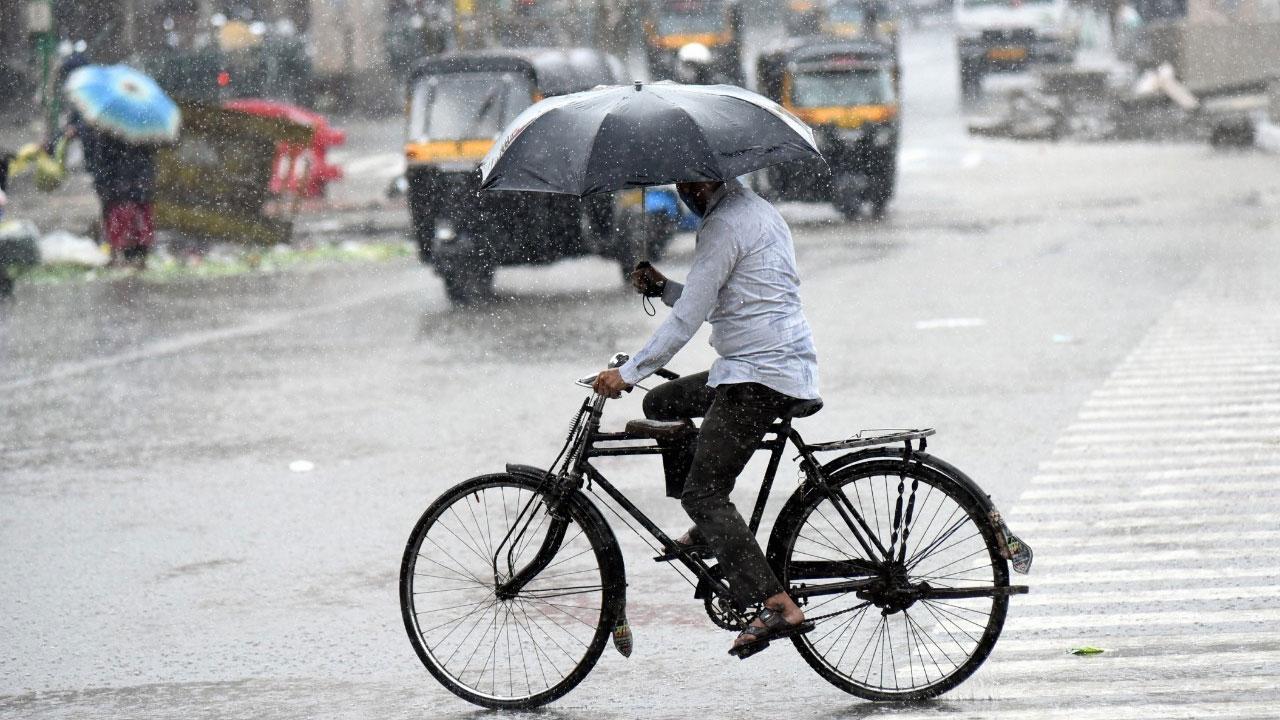The meteorological department informed, "Delhi has received highest ever 24 hours rainfall of 119.3 mm at Safdarjung Airport on 19-20 May 2021 (8:30 hours of May 19 till 8:30 hours of May 20) in last 71 years, since 1951 for the month of May."

A cyclist on a Mumbai road as heavy rains lashed the city due to cyclone Tauktae, pic: Shadab Khan
After weather conditions in the city changed under the impact of Cyclone Tauktae, Delhi recorded the highest ever rainfall of 119.3 mm in the last 24 hours since 1951 for the month of May, the India Meteorological Department (IMD) said on Thursday.
ADVERTISEMENT
"Delhi has received highest ever Rainfall of 119.3 mm since 1951 for the month of May," the IMD said in a tweet.
The meteorological department informed, "Delhi has received highest ever 24 hours rainfall of 119.3 mm at Safdarjung Airport on 19-20 May 2021 (8:30 hours of May 19 till 8:30 hours of May 20) in last 71 years, since 1951 for the month of May."
According to the IMD's data, the earlier highest was 60 mm that was observed on May 24, 1976.
Also read: Mumbai records highest ever 24-hour rain in May
"Delhi rainfall in past 24 hours till 8:30 hours of today: Safdarjung Airport -119.3 mm, Palam - 63.8 mm, Lodhi Raod - 124.4 mm, Ayanagar - 97.9 mm, Najafgarh - 92.5 mm," the IMD said.
The national capital and the adjoining area witnessed continuous rainfall since Wednesday morning as the cyclonic storm Tauktae impacted the weather conditions in several parts of Northern India.
Incessant rains in Delhi on Wednesday have led to waterlogging in several areas of the city. The movement of traffic has also been affected by the continuous rain.
A maximum temperature of 23.8 degrees was recorded in Delhi's Safdarjung area on Wednesday, the lowest maximum temperature since 1951.
As per official data, the last lowest maximum temperature of 24.8 degrees was recorded on May 13, 1982.
During the months of peak summer in the national capital, the metropolitan city is witnessing a continuous downpour, bringing the mercury down to 23 degrees Celsius.
On Wednesday, RK Jenamani, senior scientist, National Weather Forecasting Centre, IMD said, "The cyclone has now weakened and has reached its point of depression. However, its remnants are still very active in Northern India; Rajasthan, Haryana, Delhi, west of Uttar Pradesh, and Uttarakhand."
This story has been sourced from a third party syndicated feed, agencies. Mid-day accepts no responsibility or liability for its dependability, trustworthiness, reliability and data of the text. Mid-day management/mid-day.com reserves the sole right to alter, delete or remove (without notice) the content in its absolute discretion for any reason whatsoever
 Subscribe today by clicking the link and stay updated with the latest news!" Click here!
Subscribe today by clicking the link and stay updated with the latest news!" Click here!






